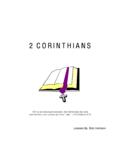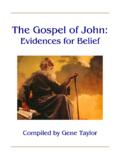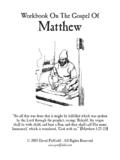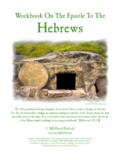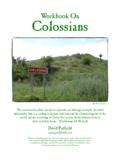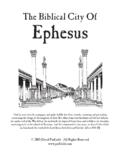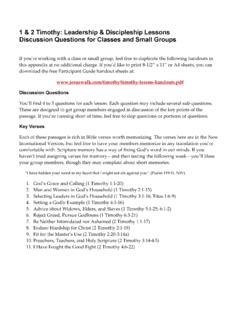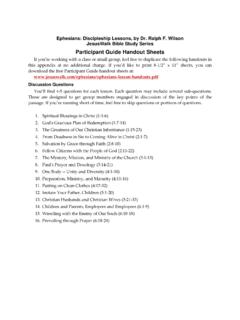Transcription of A Study of Denominations - padfield.com
1 A Study ofDenominationsGene TaylorA Study of Denominations Gene Taylor-1-PrefaceIn the first epistle to the church at Corinth, the apostle Paul strongly criticized them for being dividedand pleaded with them to be perfectly joined together in the same mind and in the same judgment. (1:10) To denominate is to divide. Thus when we see the religious world divided into manydenominations, we are viewing that which the apostle to the church in Ephesus, Paul encouraged them to be endeavoring to keep the unity of theSpirit in the bond of peace (4:3) because, he continued, There is one body and one Spirit, just as youwere called in one hope of your (v. 4). That body is the church that belongs to Jesus Christ(Ephesians 1:22-23; Colossians 1:18, 24). Though many hold to the belief that there are many churchesand you can choose the one which suits you, the New Testament tells us that such a view is not true.
2 Asa matter of fact, it stands diametrically opposed to the intent and prayer of John 17, while praying for His disciples, Jesus added, I do not pray for these alone, but also for thosewho will believe in Me through their word; that they all may be one, as You, Father, are in Me, and I inYou; that they also may be one in Us, that the world may believe that You sent Me (vv. 20-21).In an effort to help others see how they need to be a part of that one body, that one church being built byJesus Christ (Matthew 16:18), this Study was prepared. It examines several of the major denominationsand religious groups in light of the Scriptures to see whether or not they fit within the guidelines givenin God s holy word which define and delineate the Lord s group which claims to be the church of the Lord cannot put forth or stand upon any teaching,dogma or creed that has its origin with man.
3 Jesus, in speaking of the religious of his day, said of them, And in vain they worship Me, Teaching as doctrines the commandments of men. (Matthew 15:9)Thus any religious group or organization which includes the commandments of men in their worshipand practice, no matter what they claim to the contrary, is laboring in encourage all to go back to the Bible and base all their teachings and practices on its principlesalone. May this Study help you sort through the religions of men and see how they are not churches afterthe New Testament order and are thus practicing a false religion. May it cause you to seek out theLord s TaylorOctober 4, 1999A Study of Denominations Gene Taylor-2-Table of ContentsPreface ..1 Table of Contents ..2 Lesson One: Denominationalism ..3 Lesson Two: The Catholic Church.
4 7 Lesson Three: The Lutheran Church ..12 Lesson Four: The Presbyterian Church ..16 Lesson Five: The Episcopal Church ..21 Lesson Six: The Methodist Church ..25 Lesson Seven: The Baptist Church ..30 Lesson Eight: The Christian Church ..34 Lesson Nine: Seventh-Day Adventism ..37 Lesson Ten: The Mormon Church ..42 Lesson Eleven: The Jehovah s Witnesses ..50 Lesson Twelve: Holiness Churches ..56 Lesson Thirteen: The Masonic Lodge ..61 Gene Taylor, 1999. All Rights Study of Denominations Gene Taylor-3-DenominationalismIntroduction synonym for division. It consists of several hundred discordant religious sects who have nounity in name, organization, doctrine or sectarian spirit or policy, the tendency to divide into sects. is contrary to the will of people pray thanking God that there are so many different )Jesus prayed that His disciples be one as He and the Father are one.
5 (John 17:21)2)When people thank God for denominationalism, they, in reality, are thanking Him fordivision and confusion but He is not the author of confusion. (1 Cor. 14:33) apostle Paul commanded that people endeavor to keep the unity of the Spirit in thebond of peace. (Eph. 4:3) was soundly condemned among believers in the city of Corinth. (1 Cor. 1:10-13) is the result of false teaching. (2 Pet. 2:1)I. The Origins of after the first century, unscriptural changes took place in church organization whichultimately resulted in the Catholic apostasy continued to grow farther and farther away from the New Testamentpattern for the extreme corruption became evident to men, even some of its own priests, who triedto reform in the 1500 s, several efforts were made to remove the corruptions from movements were inaugurated by, among others, Martin Luther (1483-1546),Ulrich Zwingli (1484-1531), and John Calvin (1509-1564).
6 Movements resulted in Lutheran, Reformed and Calvinist Lutherans and Presbyterians, a merger of Reformed and Calvinist groups based inSwitzerland, spread their teachings and sought political power, more radical reformers,who were generally labeled Anabaptists, attempted to reproduce the New Testamentchurch in strict detail. While many of the concepts of that restitution varied and weresometimes bizarre, seed was sown which contributed to the rise of such bodies asMennonites, Independents, Baptists, Quakers and several varieties of this time, King Henry VIII (1491-1547) broke with the Roman Catholic Churchresulting in a separate Church of England or Anglican summary: The Protestant Reformation changed the religious landscape of the Westfrom one dominated by Catholicism to one dotted with nationally established churches incompetition with smaller origin in major churches of Europe came to be represented in in this country, many of these groups continued to divide internally over suchthings as national origin, language, culture, process of division has continued in America so that it is difficult to compute thenumber of Study of Denominations Gene Taylor-4-II.
7 Prominent Characteristics of Modern modern denomination is an organized form of religion that begins with some things taught orpracticed by Jesus and His apostles but changes those things by the application of human changes are made in the name of progress, service, peace, love or some other positivesounding denomination is an organization larger than the local church to which local churches belongbut smaller than the universal church for usually none claims to be the whole body of the concept of a denominational church is foreign to the New When men speak of a particular denomination, say the Baptist Church, they do notmean to imply that all the saved throughout the world are in the Baptist church. The word church here is used by them to embrace less than is embraced by the church everyone knows that the expression Baptist Church is intended to embrace morethan a congregation.
8 The denominational usage of the word church embraces too littleto be the New Testament church universal, and too much to be the New Testamentchurch local. But these are the only two New Testament usages, other than , the concept of a denominational church is foreign to the New Testament, andtherefore unscriptural. (Cecil Willis, Denominationalism, p. 1) boundaries are determined by such factors as a human designation or name whichis worn, a creed composed by men, some favorite doctrine emphasized to the exclusion of othertruths, close adherence to one or more human leaders, and institutional most widely held view among Denominations of all sorts is that it is not essential tosalvation for one to join any denomination at all so long as he in his own way respects, serves orworships is the idea that one church is as good as view is based on the belief that God accepts and approves all Defenses of vine and the branches.
9 (John 15) believe this teaches authority for divisive religious was talking about individuals (v. 6), not absurdity of this application of Jesus teaching is seen by asking whether or not onehas ever seen a single vine which bore hundreds of different kinds of The different churches are just different routes to heaven. is the way (John 14:6) not the founder of many way other than the way of Jesus is a way unto death. (Prov. 14:12) man could devise successful ways to heaven, then Jesus died for naught. (Gal. 2:21)C. All Denominations teach some truth. claim is readily admitted but some truth is not enough to save Satan tells some truth. teach some truth. Bible teaches that salvation requires the whole counsel of God. (Acts 20:27; :19) least corruption of the word of God by the teachings of men bring condemnation andmake one s religion vain.
10 (Gal. 1:6-9; Matt. 15:9)A Study of Denominations Gene Taylor-5-D. There are good people in all churches. some good people justifies a denomination, then one has to accept atheism, Hinduism,and Mohammedism because of good atheists, good Hindus, human goodness without the blood of Christ cannot human goodness and sincerity is not enough to save. (Acts 10:1-2,22; 23:1; 16:9)E. One church is as good as another. is true when applied to Denominations because one church started by man is as goodas any other church started by no church is as good as the church planned by God and being built by Jesus. ( :8-11; Matt. 16:18) blood of Christ is in no other church but His. (Acts 20:28; Eph. 5:25) to God is only in Christ s church. (Eph. 2:16) is only in the church belonging to Christ. (Acts 2:38-41,47) is the Savior of no other church but His.

